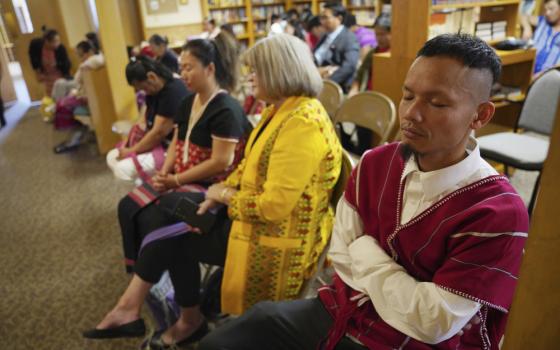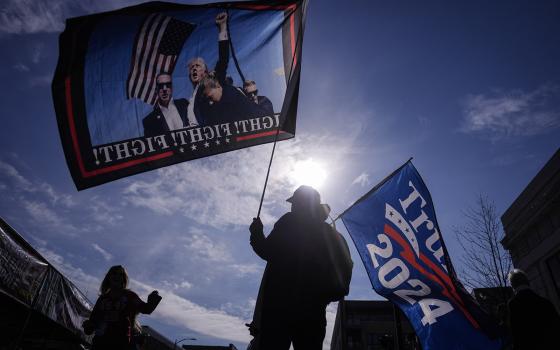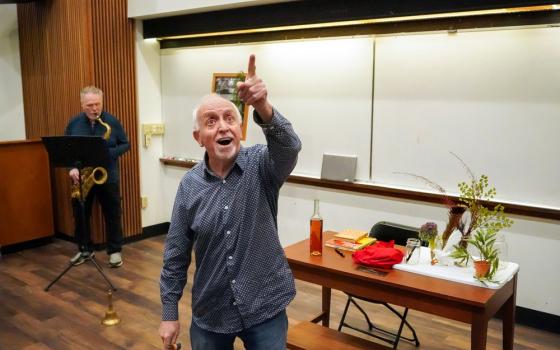Pax Christi USA, the national Catholic peace movement, has recognized the life and witness of Bishop Leroy Matthiesen by naming him the 2009 recipient of the Pax Christi USA Teacher of Peace Award.
Pax Christi USA first gave the award to Dorothy Day, co-founder of the Catholic Worker movement, in 1978 and has since recognized some of the most significant U.S. Catholic activists for peace and justice of the past 30 years, including actor Martin Sheen; poet and priest Daniel Berrigan, S.J.; and Dead Man Walking author Sr. Helen Prejean, C.S.J.
Bishop Matthiesen’s life has been defined by his long and consistent advocacy for peace and justice, from his activism as a young priest on issues of racism to his prophetic call for the abolition of nuclear weapons as a bishop with a nuclear weapons assembly facility in his diocese.
“We believe Bishop Matthiesen fulfills the criteria for the Pax Christi USA Teacher of Peace Award and exemplifies the theme ‘to reach peace, teach peace,’” reads his nomination, submitted under the names of 20 individuals, including seven former Teacher of Peace Award recipients. “It is now time—long overdue—to honor a courageous bishop, who suffered for his conscientious stands for justice and peace.”
Upon being notified that he had been recognized, Matthiesen recalled his past work to abolish nuclear weapons and the possibility that a new moment may exist to pursue that agenda even further.
“I wandered down memory lane to the 1980s, to 1983, when the U. S. Catholic bishops, I among them, raised our moral voices to warn that the world was on the brink of disaster and wound up giving conditioned moral approval of the possession of nuclear weapons as a deterrent, committing ourselves, however, to issue a blanket condemnation once the conditions changed,” Bishop Matthiesen stated. They [conditions] did change, but the bishops have not yet acted. Once I realized that we are now in a new moment for nuclear disarmament, I said yes to this award and to the invitation to speak at the awards banquet at this year’s national conference.”
In the 1980s, Matthiesen received what he has said was his own “personal wake-up call” when the Reagan administration announced that Pantex, the factory outside of Amarillo that is the final assembly point of all nuclear weapons in the U.S., would begin assembling neutron bombs. Bishop Matthiesen wrote a column in his diocesan newspaper, asking the people of his diocese to reconsider their continuation at the plant and to seek employment in peaceful pursuits.
Because of his stance, he suffered personal attacks and angry denunciations locally and nationally. But his stand for peace also energized the Catholic peace movement and garnered support from the Texas bishops, who ultimately influenced the U.S. bishops in writing their watershed pastoral letter on the nuclear arms race, “The Challenge of Peace: God’s Promise and Our Response.”
“For many of us, Bishop Matthiesen is one of those true religious leaders who not only preach the peace of Christ, but witness to it in action and with his life,” stated Dave Robinson, executive director of Pax Christi USA.
“His willingness to speak truth to power and to suffer the pushback that comes from proclaiming the gospel of peace and justice is an example to all of us.”
As a young parish priest in the 1950s, Bishop Matthiesen saw first-hand the injustice of racism when a waitress refused to serve one of the young girls with whom he was celebrating a victory following their basketball game because she was black. Fr. Matthiesen decided that the entire group would leave. Later, as editor of the diocesan newspaper, he initiated a series of articles on the racial situation in the Texas Panhandle. The series won an award from the Catholic Press Association, but also engendered the resentment of some white Catholics in the diocese.
Bishop Matthiesen will receive the Teacher of Peace award at a special banquet at Pax Christi USA’s national Catholic conference on peacemaking, to be held in Chicago, July 17-19.



